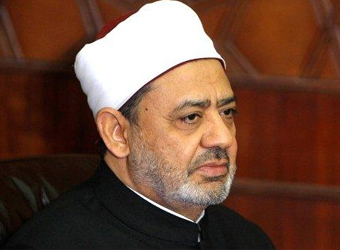In a brief statement before a conference on “The role of fatwas (Islamic edicts) in stabilising society”, Grand Imam of Al-Azhar Ahmed El-Tayeb said Islam’s teachings and legacy face an unprecedented wave of distortion at the hands of those who issue fatwas without licences and adequate knowledge.
“Unfortunately, some have been allowed to issue flawed fatwas that distort Islamic Sharia and violate Islam’s true teachings,” said El-Tayeb, urging Islamic scholars and clerics to take utmost care when issuing fatwas.
El-Tayeb said “While some unlicensed figures were allowed to issue bizarre fatwas, others issued flawed fatwas that go against Islam’s teachings, such as equalising women and men in matters of inheritance.”
“I wonder why Al-Azhar faces a wave of programmed attacks every time it gives an opinion on a certain issue, such as the inheritance question,” said El-Tayeb, accusing the fatwa institution in Tunisia, which allowed equality in inheritance between men and women of making “a big assault on Islam.”
El-Tayeb said “Those who take charge of issuing fatwas in the Arab and Islamic world should be people with a high level of learning, integrity and uprightness.” “They should be so because they are the ones entrusted with giving fatwas to those who seek answers on religion and life,” said El-Tayeb.
El-Tayeb also said muftis – or those who are officially entrusted with issuing fatwas – should have a deep background of Islamic learning and honesty in order to explain Islam’s noble values to the people.
El-Tayeb deplored that “Islam as a religion faces a ferocious campaign on its teachings and rules.” “It is the religion which comes on top of world religions facing attacks, with many trying to blame it for terrorist acts,” said El-Tayeb.
He added: “It is no coincidence that countries which spark civil wars in Islamic countries do this in tandem with calls aimed at destroying Islam’s heritage and promoting their agenda.”
Also addressing the conference, Minister of Religious Endowments Mohamed Mokhtar Gomaa said, “There is a pressing need that we stem the tide of bizarre fatwas.”
“The non-specialised people who issue fatwas without license will open gates of sedition and unrest,” said Gomaa, adding that he approved a law aimed at imposing discipline on the area of religious fatwas.
Osama El-Abd, head of parliament’s religious committee and former head of Al-Azhar University, revealed this week that a four-article law on regulating religious fatwas will be discussed soon in a plenary session in parliament.
The law, drafted by the religious affairs committee’s secretary-general and Kafr El-Sheikh governorate MP Omar Hamroush, gained the approval of all the committee’s 30 members.
“It also won the praise and official consent of Minister of Religious Endowments Mokhtar Gomaa and we hope that parliament speaker Ali Abdel-Aal will put it up for debate in a plenary session very soon,” said El-Abd.
The draft law’s first article allows Islamic clerics to issue religious fatwas only if they are members of four institutions: the Council of the Grand Scholars of Al-Azhar, Dar El-Ifta (the House of Fatwas), the Complex of Islamic Research, and the Ministry of Religious Endowments’ Department of Fatwas.
Article 2 indicates that religious lessons and preaching delivered by Al-Azhar clerics in mosques can’t be considered “fatwas.” “They can preach Muslims in mosques and show them the true teachings of their religion in a tolerant way and without taking this as a license for issuing fatwas,” the article said.
Article 3 states that members of the above institutions can deliver fatwas only via licensed media outlets, and that violators can face six years in jail and pay as much as EGP 5,000 in fines.
MP Hamroush told reporters that his draft law goes in line with Egypt’s war against religious extremism that endangers the stability and security of Egypt and the region. “It helps the state in its war to control extremist mosques, clerics, speeches, schools and financial resources,” said Hamroush.
Hamroush said his draft law mainly aims to control Salafist (ultraconservative) clerics who have issued some of the most controversial fatwas in recent weeks, such as one that makes it illegal for Muslims to congratulate Copts on Christian holidays.
“Every now and then we were shocked by such bizarre kinds of fatwas and now it is high time to control them,” said Hamroush. Source: Ahram online
Source: Ahram online
